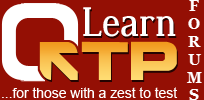I am a beginner for QTP. Currently I am doing an investigation on QTP, to decide whether to buy this tool for our company. I have to find answers to the following questions. Can any one kindly give me answers to the following questions (Refering to QTP version 10)?
1. What part of the software development life-cycle does the tool impact, i.e. from requirements to verification, or only testing/verification?
2. Can it be used to verify only software systems or also software/hardware systems (e.g. instruments)?
3. Does it support traceability between test procedures and requirements, design and/or units of code?
4. Does it support unit testing?
5. Does it support component level testing?
6. Does it support system level testing?
7. Does it integrate with a defect management tool, e.g. TestTrack?
8. Does it integrate with a configuration management tool. e.g. Perforce, Subversion?
9. How are test procedures defined, e.g. as scripts in a custom language or a standard language?
10. Can test procedures be automatically generated?
11. Can the test procedures be run automatically?
12. How does it capture evidence of running the test procedure - is it good enough the biomedical/regulated projects?
13. What, if any training is available?
14. What does the training cost?
15. How easy is it to use the tool? How easy is it to be proficient with the tool?
16. What does the tool cost? What is the maintenance cost of the tool?
17. What support infrastructure is required, if any, e.g. databases, web servers?
18. What types of technologies can it test - does it support managed (.NET) and unmanaged (non .NET) code? GUI's, e.g. Windows WinForms, WPF? Does it a support non-GUI applications?
19. What types of metrics and reports on metrics can it produce, e.g. number of tests written over time, number of passing tests written over time, code coverage, etc.?
1. What part of the software development life-cycle does the tool impact, i.e. from requirements to verification, or only testing/verification?
2. Can it be used to verify only software systems or also software/hardware systems (e.g. instruments)?
3. Does it support traceability between test procedures and requirements, design and/or units of code?
4. Does it support unit testing?
5. Does it support component level testing?
6. Does it support system level testing?
7. Does it integrate with a defect management tool, e.g. TestTrack?
8. Does it integrate with a configuration management tool. e.g. Perforce, Subversion?
9. How are test procedures defined, e.g. as scripts in a custom language or a standard language?
10. Can test procedures be automatically generated?
11. Can the test procedures be run automatically?
12. How does it capture evidence of running the test procedure - is it good enough the biomedical/regulated projects?
13. What, if any training is available?
14. What does the training cost?
15. How easy is it to use the tool? How easy is it to be proficient with the tool?
16. What does the tool cost? What is the maintenance cost of the tool?
17. What support infrastructure is required, if any, e.g. databases, web servers?
18. What types of technologies can it test - does it support managed (.NET) and unmanaged (non .NET) code? GUI's, e.g. Windows WinForms, WPF? Does it a support non-GUI applications?
19. What types of metrics and reports on metrics can it produce, e.g. number of tests written over time, number of passing tests written over time, code coverage, etc.?





